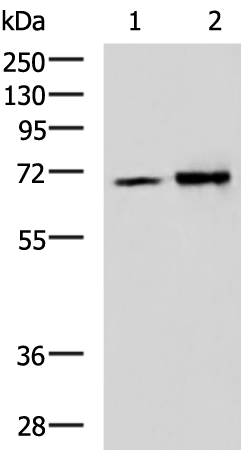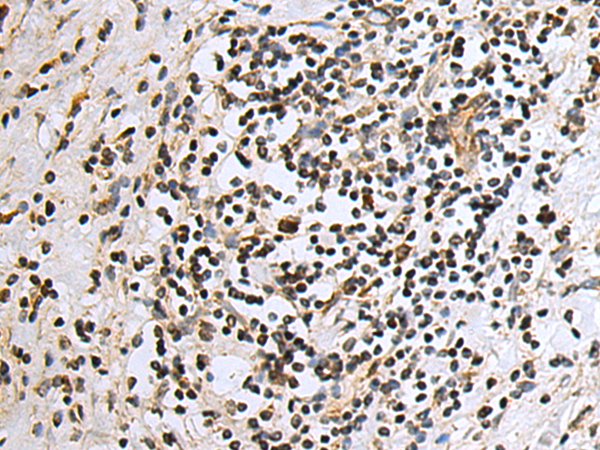

| WB | 咨询技术 | Human,Mouse,Rat |
| IF | 咨询技术 | Human,Mouse,Rat |
| IHC | 1/100-1/200 | Human,Mouse,Rat |
| ICC | 技术咨询 | Human,Mouse,Rat |
| FCM | 咨询技术 | Human,Mouse,Rat |
| Elisa | 1/5000-1/10000 | Human,Mouse,Rat |
| Aliases | KOC; CT98; IMP3; KOC1; IMP-3; VICKZ3 |
| WB Predicted band size | 64 kDa |
| Host/Isotype | Rabbit IgG |
| Antibody Type | Primary antibody |
| Storage | Store at 4°C short term. Aliquot and store at -20°C long term. Avoid freeze/thaw cycles. |
| Species Reactivity | Human, Mouse |
| Immunogen | Fusion protein of human IGF2BP3 |
| Formulation | Purified antibody in PBS with 0.05% sodium azide and 50% glycerol. |
+ +
以下是关于IGF2BP3抗体的3篇参考文献,按文献名称、作者及摘要内容简要列举:
1. **《IMP3 (IGF2BP3) expression is a marker of unfavorable prognosis in ovarian carcinoma》**
- **作者**:Li D, et al.
- **摘要**:研究通过免疫组化(IHC)分析IGF2BP3(IMP3)在卵巢癌组织中的表达,发现其高表达与肿瘤分期、转移及患者生存率降低显著相关,提示IGF2BP3抗体在预后评估中的潜在价值。
2. **《IGF2BP3 as a prognostic biomarker in pancreatic ductal adenocarcinoma》**
- **作者**:Schaeffer DF, et al.
- **摘要**:利用IGF2BP3抗体对胰腺导管腺癌(PDAC)组织进行染色,结果显示其高表达与肿瘤侵袭性增强和患者总生存期缩短相关,支持其作为PDAC的独立预后标志物。
3. **《The role of IGF2BP3 in colorectal cancer progression and chemoresistance》**
- **作者**:Wang T, et al.
- **摘要**:通过Western blot和IHC技术,研究证实IGF2BP3在结直肠癌中通过调控mRNA稳定性促进肿瘤增殖和化疗耐药,抗体的应用为靶向治疗提供了实验依据。
4. **《IMP3 promotes cell migration and invasion in lung adenocarcinoma》**
- **作者**:Huang W, et al.
- **摘要**:结合流式细胞术和IHC,研究发现IGF2BP3在肺腺癌中高表达,其抗体检测显示其通过激活Wnt/β-catenin通路增强肿瘤迁移和侵袭能力。
以上文献均以IGF2BP3抗体为核心实验工具,涵盖卵巢癌、胰腺癌、结直肠癌及肺癌研究,聚焦预后评估、分子机制及治疗靶点探索。
The insulin-like growth factor 2 mRNA-binding protein 3 (IGF2BP3), also known as IMP3. is a member of the conserved IGF2BP family of RNA-binding proteins. It plays a critical role in post-transcriptional gene regulation by binding to target mRNAs, influencing their stability, localization, and translation. Structurally, IGF2BP3 contains six RNA-binding domains, including two RNA recognition motifs (RRMs) and four K-homology (KH) domains, enabling its interaction with specific mRNA sequences, particularly in the 3' untranslated regions (UTRs).
IGF2BP3 is predominantly expressed during embryonic development but is largely absent in most adult tissues. However, its re-expression is frequently observed in various cancers, including pancreatic, colorectal, ovarian, and lung cancers, where it promotes tumor progression by enhancing the stability and translation of oncogenic mRNAs (e.g., MYC, IGF2. ACTB). Overexpression of IGF2BP3 is associated with aggressive tumor behavior, metastasis, and poor clinical outcomes, making it a potential prognostic biomarker.
Antibodies targeting IGF2BP3 are widely used in research and diagnostics to detect its expression in tissues or cell lines via techniques like immunohistochemistry (IHC), Western blotting, or immunofluorescence. These tools help elucidate its role in cancer biology and its interactions with RNA networks. Clinically, IGF2BP3 antibodies aid in distinguishing malignant from benign lesions, particularly in challenging diagnoses like pancreaticobiliary tumors. Despite its therapeutic potential as a cancer target, drug development remains exploratory, with current focus on understanding its regulatory mechanisms and oncogenic pathways.
×